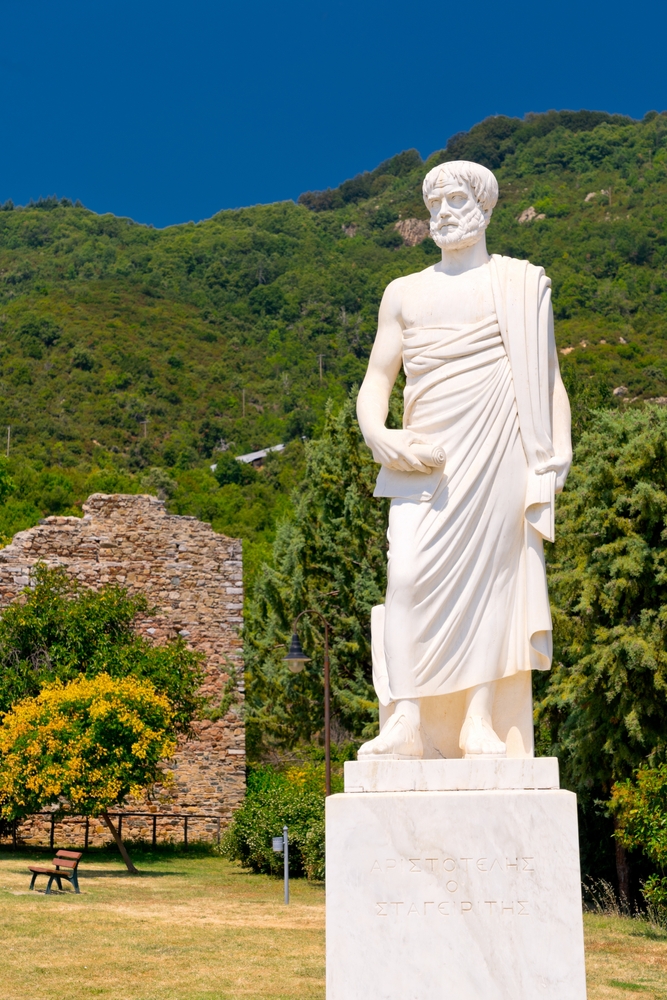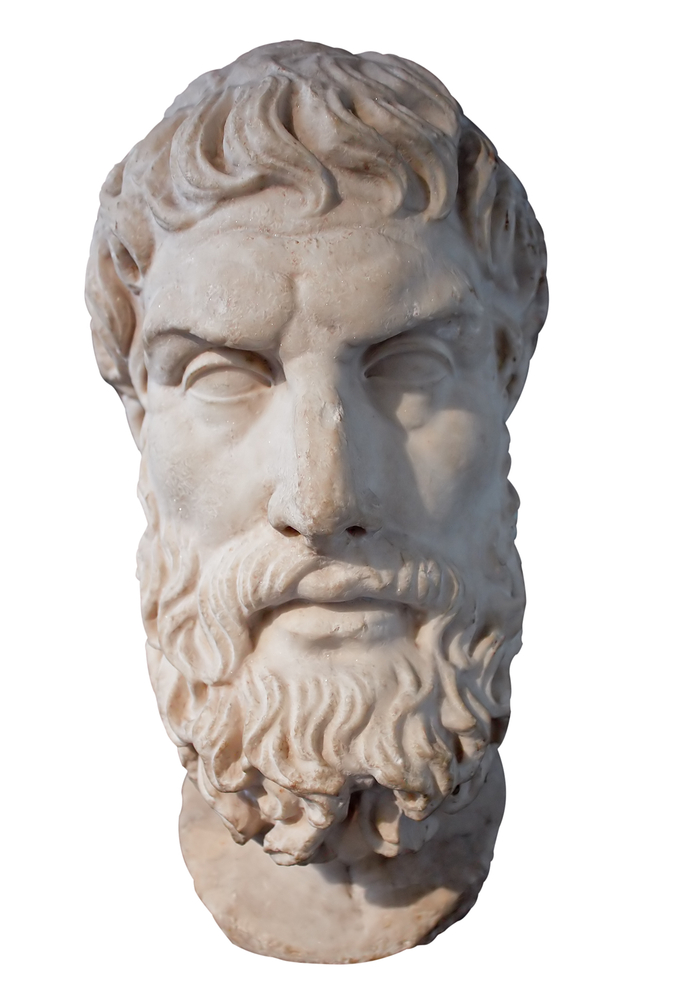
Exploring the Wisdom of the Ancients
Delve into the profound legacies of Ancient Greek scholars, philosophers, and historians with our AI-powered summaries. This dedicated section of our website offers concise and insightful overviews of classical works, providing you a swift gateway to understanding their timeless ideas and philosophies. Each summary distills the essence of major works, from the ethereal dialogues of Plato to the rigorous histories of Herodotus, making the rich heritage of Greek thought accessible at a glance. Join us in bridging the past with the future as we harness modern AI technology to revive ancient wisdom for today's readers.
Subcategories
Plato 6
 Plato was a Greek philosopher who lived in ancient Greece from around 427-347 BCE. He was a student of Socrates and a teacher of Aristotle. He is considered one of the most important figures in the development of Western philosophy, and his work has had a profound influence on the development of Western thought.
Plato was a Greek philosopher who lived in ancient Greece from around 427-347 BCE. He was a student of Socrates and a teacher of Aristotle. He is considered one of the most important figures in the development of Western philosophy, and his work has had a profound influence on the development of Western thought.
Plato is best known for his written works, which include a number of dialogues featuring Socrates as the main character. These dialogues cover a wide range of topics, including politics, ethics, metaphysics, and epistemology. Some of Plato's most famous works include The Republic, The Symposium, and The Apology. These works continue to be widely studied and debated to this day, and they are considered some of the most important texts in the Western philosophical tradition.
Plato was also a student of Socrates, and many of his dialogues are set up as a conversation between Socrates and other characters, in which Socrates presents his ideas and the other characters ask questions and give their own opinions. Plato's dialogues are notable for their use of the Socratic method, a method of teaching and learning that involves asking questions and encouraging critical thinking.
Plato's ideas and concepts continue to be discussed and debated to this day. His views on the nature of reality, the nature of knowledge, the role of justice in society, and the nature of the human soul have all had a significant impact on the development of Western philosophy and continue to be studied and debated today.
Plato founded the Academy in Athens, the first institution of higher learning in the Western world. It was there where many of the most famous philosophers of the time studied and taught, including Aristotle.
Some of his most famous written works include:
- The Republic - This is Plato's most famous work and is considered one of the most important texts in the Western philosophical tradition. It is a dialogue between Socrates and other characters, in which they discuss the nature of justice, the ideal state, and the nature of reality.
- The Symposium - This work is a philosophical dialogue about the nature of love and desire. It features a series of speeches by various characters, including Socrates, about the nature of love and its relationship to the soul and to beauty.
- The Timaeus - This is a philosophical dialogue that explores the nature of reality and the relationship between the physical and the non-physical world. It is one of Plato's later works and is considered one of his most important contributions to the development of Western philosophy.
- The Parmenides - This is a philosophical dialogue in which Parmenides and Zeno argue about the nature of reality, the relationship between form and matter, and the nature of being.
- The Phaedo - This is a philosophical dialogue in which Socrates discusses the nature of the soul and the afterlife with his friends.
- The Apology - This is Plato's account of the trial and execution of Socrates. It is considered one of the most important sources of information about Socrates and his philosophy.
These are some of Plato's most famous written works, but he wrote many others as well, including letters, poems, and other philosophical dialogues. All of Plato's works continue to be widely studied and debated, and they are considered some of the most important texts in the Western philosophical tradition.
Aristotle 6
 Aristotle (384-322 BCE) was a Greek philosopher and scientist who is considered one of the most important figures in Western thought. He was a student of Plato and tutored Alexander the Great. Aristotle is known for his wide-ranging contributions to philosophy, including works on ethics, politics, metaphysics, logic, biology, and physics.
Aristotle (384-322 BCE) was a Greek philosopher and scientist who is considered one of the most important figures in Western thought. He was a student of Plato and tutored Alexander the Great. Aristotle is known for his wide-ranging contributions to philosophy, including works on ethics, politics, metaphysics, logic, biology, and physics.
Aristotle was born in Stagira, Greece, and was the son of a physician. He studied at Plato's Academy in Athens for 20 years, but later broke up with his teacher and founded his own school, the Lyceum. The Lyceum was a center of learning that attracted scholars and thinkers from all over the world.
Aristotle's contributions to philosophy and science were vast and diverse. He developed a system of logic that became the basis for Western philosophy and science, and his ideas about ethics, politics, and metaphysics have had a profound and lasting impact on Western thought. In addition, Aristotle made important contributions to biology, including his studies of animals and his classification system that influenced the work of naturalists for centuries.
After the death of Alexander the Great, Aristotle's fortunes declined. He was charged with impiety, and although he fled to Chalcis, he died the following year. Nevertheless, his ideas continued to influence the development of Western thought for centuries to come, and he remains one of the most important figures in the history of philosophy and science.
Aristotle is one of the most important figures in Western philosophy, and his works have had a profound and lasting impact on the development of philosophy, science, and politics. Here are some of his most important works:
-
"Nicomachean Ethics": This work is considered one of Aristotle's most important and enduring works, and it explores the nature of happiness, the virtues, and the relationship between ethics and politics.
-
"Politics": This work examines the nature of the state, the ideal form of government, and the role of the citizen in political life. It is also one of the earliest works of political science.
-
"Metaphysics": This work explores the fundamental principles of reality, including the nature of being, causality, and substance. It is one of the most important works of metaphysics in Western philosophy.
-
"Physics": This work is a foundational text in the development of Western science, and it explores the nature of motion, space, time, and matter.
-
"On the Soul": This work examines the nature of the soul and its relationship to the body, and it is an important work in the development of psychology and cognitive science.
-
"Poetics": This work examines the nature of drama and literature, and it has had a lasting impact on the development of literary theory and criticism.
Overall, Aristotle's works cover a wide range of topics and have had a significant impact on the development of philosophy, science, and politics, making him one of the most important figures in the history of Western thought.
Xenophon 1
Xenophon was a Greek historian, philosopher, and soldier who lived in ancient Greece from around 430-354 BCE. He was a student of Socrates and is known for his historical works and his writings on philosophy and politics.
Xenophon is best known for his historical works, which include the Anabasis, an account of the expedition of Cyrus the Younger against his brother, King Artaxerxes II of Persia and Hellenica, a history of Greece from the end of the Peloponnesian War to the Battle of Mantinea in 362 BCE. These works are considered valuable primary sources for understanding the history of ancient Greece and continue to be widely studied today.
Xenophon also wrote on philosophy and politics, his most famous being the Memorabilia, a collection of conversations and speeches of Socrates that Xenophon himself had attended. This work is considered an important source of information on Socrates and the Socratic method. Xenophon's ideas on politics and government, as well as his ideas on the nature of leadership and good governance, continue to be studied and debated today.
In summary, Xenophon was a Greek historian, philosopher, and soldier who lived in ancient Greece from around 430-354 BCE. He was a student of Socrates and is known for his historical works, such as the Anabasis and Hellenica, and his writings on philosophy and politics, such as Memorabilia. His historical works are considered valuable primary sources for understanding the history of ancient Greece, and his ideas on politics, governance, and leadership continue to be studied and debated today.
Epicurus 5
 Epicurus was an ancient Greek philosopher who lived from 341 BCE to 270 BCE. He is known for his philosophical school of thought called Epicureanism, which emphasized the importance of living a happy and fulfilled life through the pursuit of pleasure and the avoidance of pain.
Epicurus was an ancient Greek philosopher who lived from 341 BCE to 270 BCE. He is known for his philosophical school of thought called Epicureanism, which emphasized the importance of living a happy and fulfilled life through the pursuit of pleasure and the avoidance of pain.
Epicurus believed that the ultimate goal in life was to achieve ataraxia, or a state of tranquility and freedom from fear and anxiety. He taught that this could be achieved by living a simple life, cultivating friendships, and avoiding excesses of any kind.
Epicurus also believed that the gods, if they existed, were not interested in human affairs and therefore should not be feared or worshipped. Instead, he argued that the universe was made up of atoms and that everything in the world could be explained by natural causes.
Although Epicureanism has been largely misunderstood throughout history as a philosophy of indulgence, it was in fact a highly ethical and moral philosophy that sought to help people live happy and fulfilling lives.
Epicurus wrote extensively throughout his life, but unfortunately, only a few fragments of his works have survived to the present day. Most of what we know about his philosophy comes from the writings of his followers and critics.
Some of his most famous works include:
-
Letter to Menoeceus: A letter Epicurus wrote to his student Menoeceus, which outlines his philosophy of living a happy life.
-
Principal Doctrines: A collection of 40 brief sayings that summarize Epicurus' teachings on ethics and metaphysics.
-
On Nature: A treatise on the nature of the universe and the origins of life, in which Epicurus proposed his theory of atomism.
-
Vatican Sayings: A collection of Epicurean maxims that were discovered in the Vatican library in the 16th century.
-
On the Goal: A work in which Epicurus discusses the ultimate goal of human life and how it can be achieved.
Although many of Epicurus' works have been lost, his philosophy had a profound influence on the development of Western thought and continues to be studied and debated by philosophers today.
